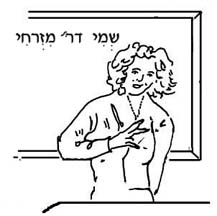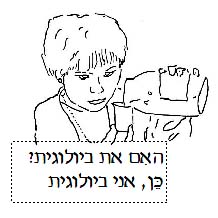CHAPTER TWO
יְחידה שְתּיים
IN THIS CHAPTER YOU WILL LEARN TO:
-
Consolidate Your Reading Skills using the Hebrew Alphabet
-
Recognize the Complete Set of Vowel Marks
-
Count from Zero to Ten
-
Use Demonstrative Pronoun "this"
-
Introduction of Past Tense
-
Use Subject Pronouns
-
Use Possessive Pronouns
-
Make a Negative Statement
-
Identify Parts of the Body
-
Recognize and Use the Past Tense for Simple Declarations
-
Express Ownership
-
Sing Songs of Idealism and Love
-
Practice "Gisting" With More Extended Texts
Use the Software. Do
the flashcard drills to learn the vocabulary for Chapter Two. On the
"Main Menu" screen choose "Flashcard Tools. Use the three flashcard
learning modules, study, match and translate, for each lesson as
assigned. This will ensure that you master the vocabulary as you
proceed.![]()
Navigate to the booklet containing all the exercises for Chapter Two which require written responses. Print out this exercise booklet and do that sections exercise when you see the icon of a pencil.
71
2.1
דוּ-שיח
100.00 %
The English words in italics represent David's inner thoughts as he sruggles to converse in Hebrew.
Hint: Knowing the context often helps you guess the meaning of unfamiliar words.
| רינה: | שלום דוד! מה חדש? |
| דוד: |
Oh boy! Here comes that "Rina" character. Well, I guess I'll tell her I learned to read Hebrew. .שלום רינה, למדְתי לִקְרוא עִבְרית |
| רינה: | בֶּאֱמֶת? כְבר למדְת *אֶת האלֶף-בֵּית? |
| דוד | כֵן. אני יודֵעַ לִקְרוא וְלִכְתוב. !Boy, she talks fast |
| רינה: | אתה כתבְת משֶהוּ? |
| דוד: | אֶה רינה, יותֵר לְאט בְּבקשה. |
| רינה: | או, סְליחה דוד. שכחְתי לְרֶגע. אתה כתבְת משֶהוּ ? |
| דוד: | .Mmm--I'll tell her I wrote my folks כתבְתי מיכְתב לְאבּא וּלְאמא. |
| רינה: | אֵיפׂה ההורים שֶלְךָ ? |
| דוד: |
I'm pretty sure 'אֵיפׂה' means 'where'. Well here goes nothing . . . .הֵם באמֶריקה, בְּפילדֶלְפיה |
| רינה: | פילדֶלְפיה? יֵש לי דוד וְדודה בְּפילדֶלְפיה. אוּלַי אתה מכּיר אֶת הדוד שֶלי. הוּא אדם חשוּב, הוּא פרופֶסור |
| דוד: | Hold it Rina, wait a sec, Not so fast!!רֶגע! רֶגע |

*
Although אֶת is not a "word" in our sense of the term, it has important significance in the Hebrew sentence. It indicates whether a noun is serving as a direct object in a sentence. For more information look at ¶2.26.2. For a more complete discussion see ¶3.24.
72
_
2.1.1 אוצר מילים - LISTENING FOR KEY WORDS IN THE DIALOG
100.00 %
![]() Use with
Software Chapter 2:3 "Listening Comprehension"
Use with
Software Chapter 2:3 "Listening Comprehension"
As you progress in your reading skills, remember that the letters ב כ פ are always pronounces as if they have a dot in them /b/ ּבּ /k/ כּ /p/ פּּ even if the dot is not included. The only exception is in foreign words.
Listen to the audio for this exercise and place a
check mark next to each word on the exercise pag![]() e for this section when you hear it.
e for this section when you hear it.

כְּבר
alreadyבֶּאֱמֶת
reallyלמדְתי
I learnedכּתבְת
you wroteמשֶהוּ
somethingמיכְתב
a letterהורים
parentsאוּלַי
perhaps, maybeQuestions:
Answer these questions, in your own words in Hebrew, on
the printed exercise sheet.
![]()
(Avoid peeking at the text of the dialog.)
-
What did דוד announce to רינה?
-
He claims to have used his new skill. What did he say?
-
She doesn't say "your mom and dad". What does she say instead?
-
What word does she use to express surprise?
2.1.2 שְמות עֶצֶם - Nouns that refer to people
Many of the nouns we will learn have both masculine and feminine forms. For example, teacher is both (m)מורֶה and (f) מורה. Nouns that end in a consonant in the masculine form often add the ending /iht/ or /ah/ for the feminine form.
librarian = ספְרן, ספְרנית ambassador = שגְריר, שגְרירה
73
As you do this exercise look at the ending of the words in column one. Decide the gender of the person in each occupation. Now choose and circle a masculine or feminine name for each occupation. You should be able to guess the gender for most of the occupations and names.
100.00 %
Feminine Names
Masculine Names Ocupations-
פְּרוֹפֶסוֹרית * א. עמוס ב. רינה
-
בִיולוג א. יואֵל ב. דְבורה
-
פְסיכולוג א. דוד ב. תמר
-
אגְרונומית א. צְבי ב. צִבְיה
-
פסיכולוגית א. מֹשֶה ב. מִרְיַם
-
סוציולוג א. אורי ב. חנה
-
ארְכֵיאולוג א. דניאל ב. רוּת
-
פסיכיאטֶרית א. מיכאֵל ב. לֵאה
-
רב (rabbi) א. שלֹמֹה ב. שושנה
*Some Hebrew speakers regard פרופסורית as an error and use פרופסור for both men and women.
100.00 %

2.2 שְאֵלות בעברית - ASKING QUESTIONS IN HEBREW
Hebrew can indicate that a sentence is a question in two different ways:
1) With rising voice intonation at the end of the sentence.
אתה כּתבְת משֶהוּ ?
2) By beginning the question with the question-mark word. האִם
האִם אתה כּתבְת משֶהוּ ?
Both sentences mean, "Did you write something?
74

2.2.1 -
האִם
למדְת אֶת
האלֶף־בֵית?Did you learn the Alphabet?
האִם למדְת אֶת האלֶף־בֵית?
Did you learn the Alphabet?
2.2.2 שְאֵלות - Posing Questions
Here is one side of a conversation between חיים and אורה. She is certain that he's not an Israeli and is curious about him. Using האִם, write on the blank line the questions אורה must have asked to produce the responses חיים gave.
אורה:
? ________________________חיים: אני סְטוּדנט באוּניברסיטה.
אורה:
? ______________________חיים: אני לומֵד פְסיכולוגיה וּמתֵמטיקה.
אורה:
? _______________________חיים: כן, אני מֵאמֶריקה.
אורה:
? _____________________
חיים: מִפילדֶלְפִיָה.
100.00 %
Listen to the audio to check your answers.

75
2.2.3 הבנת הנִשְמע - Dialog Comprehension Check
![]() Use with
Software Chapter 2:4 "Complete the Sentence"
Use with
Software Chapter 2:4 "Complete the Sentence"
On the printed exercise sheet circle your answer - כֵּן or לֹא , basing your answers on the dialog in ¶2.1.
בְּבקשה לענות "כֵּן" או "לֹא"
![]()
האם רינה סְטוּדֶנְטית?
כֵּן לא
רינה בְּיִשֹראֵל?
כֵּן לא
האם דוד כְּבר יודֵעַ אֶת
האלֶף־בֵית?כֵּן לא
האם אבּא שֶל דוִד כתב מיכְתב לְדוד?
כֵּן לא
ה
הורים שֶל דוִד בּיְרוּשליִם?כֵּן לא
ה
דוד שֶל רינה גר בְפילדֶלְפיה?כֵּן לא
דוִד כְּבר למד לִקְרוא עבְרית?
כֵּן לא
100.00 %
2.2.4 למלֵא אֶת החסֵר
Complete the missing part of the sentence. Your
answer should be based on the dialogue in ¶ 2.1.
![]() Fill
in the answers on your exercise sheet before listening to the audio.
Fill
in the answers on your exercise sheet before listening to the audio.
דוִד כְּבר למד
אֶת ה_________________ .הוּא כְּבר______________לִקְרוא.
דוִד כּתב______________להורים ב ______________
דוִד לא מכּיר
אֶת ה_______________ שֶל רינה.100.00 %
2.3 לֹא - 'NO' OR 'NOT' IN HEBREW
Remember that the word לֹא mean no or not (negation)/
100.00 %
אני לֹא יודֵעַ
I do not knowהיא לֹא גְבוהָה
She's not tallלֹא, אני לֹא סְטוּדֶנטית
No, I'm not a studentלֹא למדְתי לִקְרוא
I didn't (did not) learn how to read76
הֶעָרָה
FYI לידיעתך
Remember: You can change the speed of the audio. Play it slower or faster. The number indicates the speed. If you want to return to the normal speed, just click on the icon before the number.